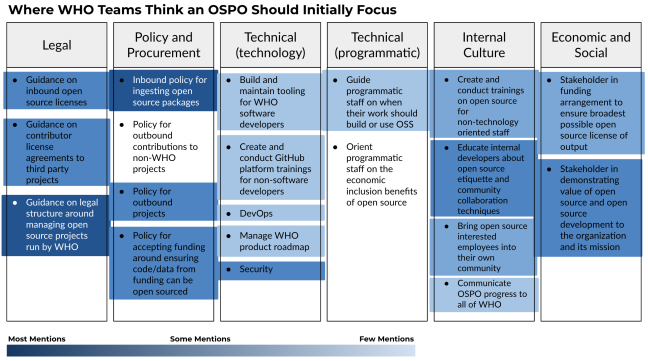The World Health Organization (WHO) is the first agency of the United Nations (UN) to launch a formal Open Source Programme Office (OSPO). The OSPO is already the norm for realising value from open source in the technology industry, more and more government organisations are now creating them.
The reason for creating a central construct dealing with open source stems from the importance of technology in the delivery of public health efforts. Looking to the full public health ecosystem, data, AI and by extension software is everywhere. In fact, if you deal with software today, you are automatically dealing with open source.
The OSPO is meant to increase an organisation’s capacity to use and develop open source solutions. In industry, OSPOs are well established. Typically, they provide different parts of the organisation with legal and technical support services so that the stated open source goals are met. There is significant diversity of mandates, staff and focuses. This diversity is a result of open source’s ubiquity in software development. The companies build different kinds of OSPOs to achieve different kinds of goals.
As has been reported on in OSOR earlier, there is growing momentum behind the movement to establish OSPOs in governments.
Ayman Badr, Digital Programme Manager of the WHO: “People across the globe, in the health sector and beyond, work tirelessly to better understand and address public health needs but face barriers that limit the impact of their work. The WHO OSPO, through the Pandemic and Epidemic Hub in Berlin, aims to promote collaboration and empower decision makers, public health professionals, and civil society to make informed public health decisions”
The WHO’s OSPO has the traditional features of an OSPO. It will deal with the legal, policy and technological aspects of open source.

Source: https://socialimpact.github.com/insights/world-health-organization-OSPO…
However, as the first OSPO within the UN system, broader social and economic considerations are also included in the OSPO-creation.
The WHO has identified that the OSPO may increase open source software employment opportunities in low- and middle-income countries. This could directly be affected as UN agencies are some countries’ largest employers of technologists. However, there is also research showing the positive economic externalities of governments’ open source usage and deployment.
An additional goal is for the OSPO to act as a vehicle to create new and support existing Digital Public Goods. The goal of this work is to reduce effort duplication in the responses to humanitarian crises and get the most out of funding.
Moreover, as was identified by the European Commission when it created its OSPO, it is also built to be a driver of organisational change. While the OSPO helps an organisation to work effectively with open source software, open source itself has the tendency to shift an organisation’ culture towards more transparency and collaboration, as these are basic tenets of the open source model.

